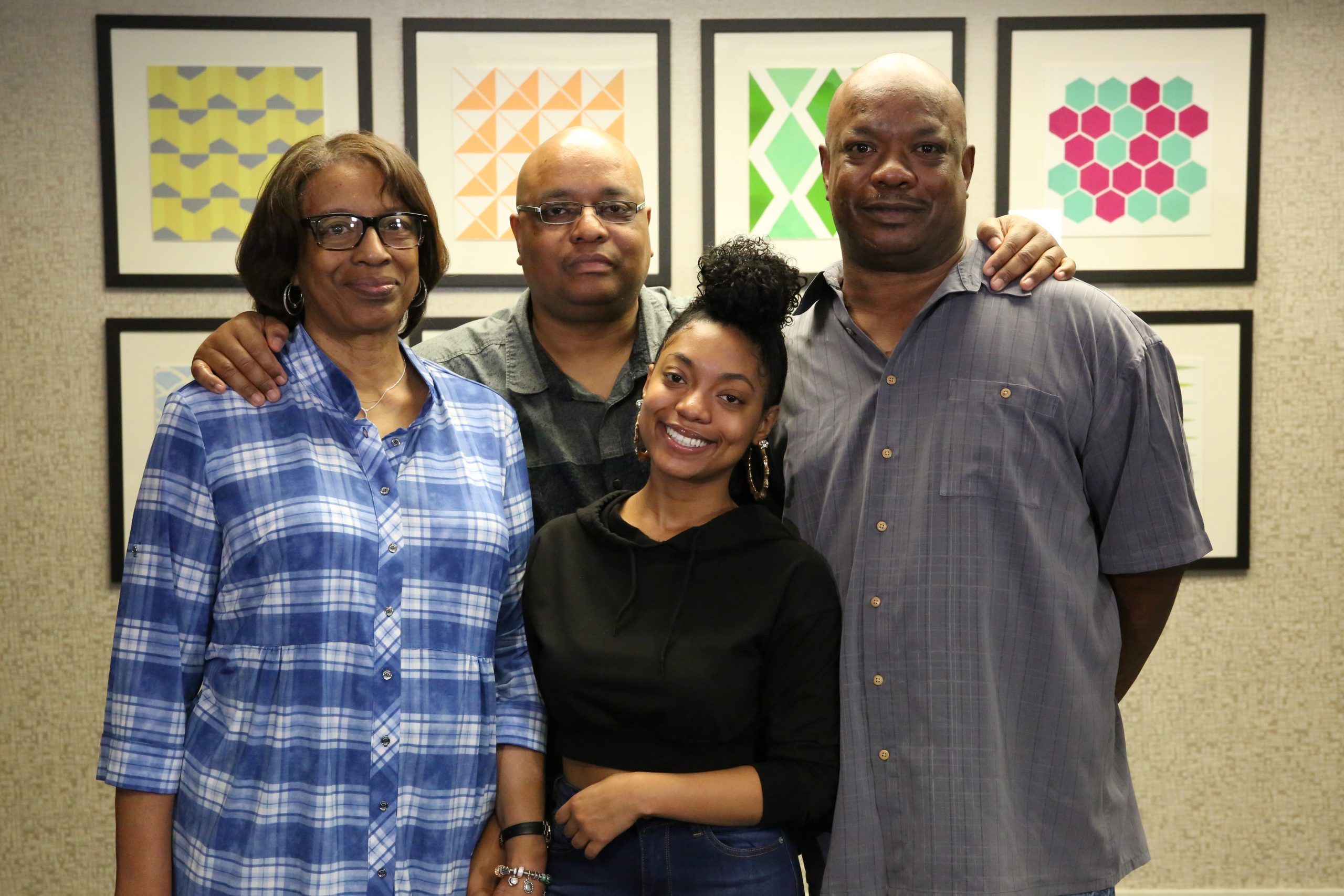The night of May 14, 1970, was just like any other night on the yard, author Vernon Weakley says. He and other members of Omega Psi Phi fraternity and Delta Sigma Theta sorority were hanging out in front of Alexander Hall, a girls’ dorm, when a white guy came through campus in a truck hurling racial slurs at students, he remembers. In retaliation, male students threw items at the truck, and after the driver escaped and ran, they set the truck on fire.
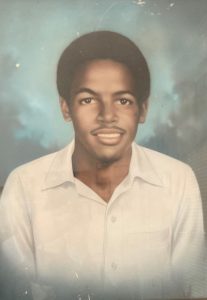
Mississippi Highway Patrolmen were called in to put out the fire, but Weakley is adamant that the logistics don’t add up. “How would they have known to have all those policemen in riot gear, a tank. That’s not something you do in an hour. They were there, and they were waiting,” he says.
As he recounts the events, Weakley stands beside his placard, which is part of Jackson State University’s “Tragedy and Triumph: The Lives of the Gibbs-Green Survivors” exhibit, which honors the victims and survivors of the May 15, 1970, shooting where Mississippi Highway Patrolmen shot several rounds of ammunition across the college’s campus in the early-morning hours.
After extinguishing the fire, the patrolmen came back through campus and passed a boys’ dorm, where male students started throwing stuff and screaming at them, he says. The patrolmen paid it no mind, but pandemonium ensued once they got to Alexander Hall.
“They came on down to us, and we thought they were going to do the same thing. We’re screaming and hollering at them like the boys were doing. Next thing we know, they started shooting,” the author said.
‘I Saw Other People Getting Shot’
Weakley was only a few feet from the patrolmen and recalls turning to run when he was struck immediately and knocked down. He remembers shots ringing out for one to two minutes.
“I saw all the carnage. I saw other people getting shot,” he says now. “I saw so many other people just get hurt. I saw people fighting trying to get in. It was an unbelievable site. The sky lit up like daytime, traces from the bullets were shooting all over our heads. It’s something I’ll never forget,” he says.
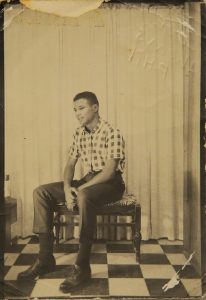
The shooting resulted in the deaths of 21-year-old Philip Lafayette Gibbs and 17-year-old James Earl Green, while injuring 11 others: Fonzie Coleman, Leroy Kentor, Gloria Mayhorn, Climmie Johnson, Andrea Reese, Stella Spinks, Lonzie Thompson, Redd Wilson Jr., Tuwaine Davis, Willie Woodard and Vernon Weakley.
“When I was in high school, I was a naive, God-fearing kid, but coming to Jackson State, joining a fraternity and having this occur to me, the shooting, it just changed me forever,” Weakley says.
‘Beyond the Moment of Their Victimization’
Against golden walls sit five placards with family photos and biographies of victims from the 1970 Gibbs-Green tragedy: Gibbs, Green, Weakley, Hayes and Kenter Jr. A steady crowd of students, community members and faculty pour into the space, going from placard to placard and reading silently.
This year marks 50 years since the tragic event’s inception, and this event on Feb. 27, 2020 is an effort on the student body’s part to commemorate the lives affected, Director of the Margaret Walker Center Robert Luckett says. The exhibit has taken at least nine months of planning, with most efforts going into contacting as many survivors as possible and tracking their lives since 1970, the director says.
“That’s really the purpose of this event, to see them as people beyond the moment of their victimization. All these people still had lives to live. We’re just excited to be at a point to be able to tell their stories and expand beyond the point where we’re at now as we collect more stories and get in touch with more people,” Luckett says.
Vernon Weakley’s life spiraled out of control following the shooting but says it was advice from his family doctor, A.B. Britain, who attended to his wounds that night, that helped him set his life back on track.
“He gave me a long lecture after the shooting about being militant, working in the system. I took it to head and changed my life as a result and became a born-again Christian,” Weakley says.
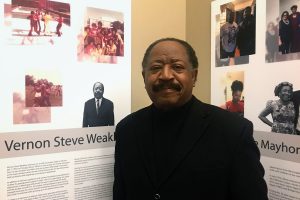
He worked for the Internal Revenue Service for more than 34 years. Among his many accomplishments, Weakley is now an acclaimed author of “The History of Omega Psi Phi Fraternity Inc.,” “Fear No Evil” and the national bestselling nonfiction book “Standing at the Edge of Madness,” a firsthand account of the shooting. He is also the founder and CEO of Zworldnet Publishing, a book publishing company, and the co-owner of Toval/Weakley Records in Houston, Texas.
“God is good. He rerouted my life,” Weakley says. “The shooting straightened me out and made me listen to reason, made me redirect in a serious way, which I probably would not have had it not occurred.”
‘Know Your History’
Alexis Johnson, a sophomore criminal-justice major from Cleveland, Ohio, says that during an HBCU tour to Jackson State, she saw signs around campus about the Green-Gibbs shooting but wasn’t aware about what exactly happened. It wasn’t until her freshman year at the school that she got the full story.
“Staying in Alexander (Hall), I didn’t understand it, but now that I have more information about it, I take pride in being black and staying in Alexander,” Johnson says. “They risked their lives so that I could stay in Alexander and be there freely and not have to worry about getting shot. I appreciate the sacrifice.”
Work study allowed her the opportunity to transcribe the interview with Dale Gibbs, Phillip Gibbs’ widow, which she says allowed her to gain a whole new perspective. “They were so young and had their whole lives ahead of them, and it was just taken away. She expected him to come home, and we all expect that,” the sophomore says.
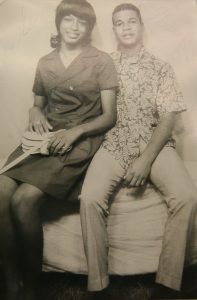
The interview with Dale Gibbs is an amazing accomplishment for Dr. Luckett, who has been trying to get in contact with the Gibbs family for years.
“Slowly, but surely I got in touch with people who said they knew them, and I told them if you know them, give them my contact information or contact us at the center. And one day this past summer, Phillip Gibbs’ widow, Dale Gibbs, called me out of the blue,” Luckett says.
As an added bonus to scoring the interview, the Gibbs family is attending the 50th commemoration virtual ceremony on May 14 at 7:30 p.m., central time, which is very exciting, he adds.
Luckett highlights that the exhibit helps people acknowledge and grapple with the past, while providing support and love to those that are still healing from the psychological and physical trauma of that night.
“I think it’s incredibly important for us to understand and remember that state-sanctioned violence aimed at black communities hasn’t been invented in the last five years. It has been a systemic part of American history and Jackson State is a part of that story in 1970,” Luckett says.
You can join the Virtual Town Hall Thursday, May 14, at 7:30 p.m. via Zoom here. Dr. Robert. Luckett will moderate the Virtual Town Hall, and the panelists will be: Dale Gibbs, widow of Phillip Gibbs; Vernon Weakly, student shot on campus by Jackson police officer; Gailya Porter, student injured by flying debris; and Lap Baker, student eyewitness. It will also stream on the Jackson State University Facebook page and Youtube.
Clarification: In the story above, we have clarified that the shootings of Gibbs and Green happened very early morning on May 15, 1970.

